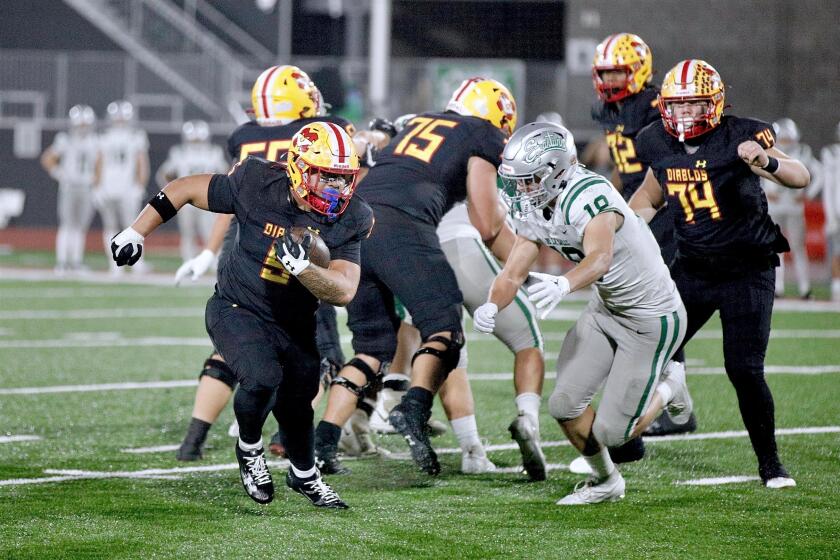Collected Truths of Comics and Kareems
When John Robinson decided to go into coaching, the world lost a great bartender or barber.
Customer: “Set ‘em up, John. And what should we discuss today? My love life, Dante’s Inferno, or the suitability of the draw play on second and short?”
Robinson: “Actually, I think all those topics are related.”
One way or another, Robinson was destined to wind up in a line of work where he could exert a strong influence on people’s heads. As fate would have it, he now coaches the L.A. Rams, an Orange County outfit that has pretty much taken on the personality of its coach.
It’s tough to catch Robinson in a funk. Even early morning is not a good time to find him in a bad mood. The coffee hasn’t even had time to kick in, but there’s smilin’ John. Hey! Pull up a chair! Grab a waffle! What’s on your mind?
OK, it’s easy to be upbeat when you’re not beat up. Anyone could be jolly coaching the world’s greatest running back, a potentially brilliant young quarterback, a new state-of-the-art offense and a legitimate Super Bowl cast that’s unbeaten (1-0).
But there’s cause and effect to consider. When Robinson joined the Rams, he was already jolly and confident, a proven winner. The Rams were none of the above. One side’s attitude had to prevail. Guess which one did.
“I’m not going to trap myself into not enjoying this,” Robinson says. “I’m doing a much better job now of liking the process (of coaching), rather than existing only for the end result. You get to the point where you say, ‘Hey, I enjoy going out there, coaching.’
“One of the things that went wrong at USC was I got to where I wasn’t enjoying the process as much as I should. . . . I got a real lesson when I got out of coaching. I started to look around, saying ‘Wow!’ ”
That’s “Wow!” as in “Oh, no!” After a quick look at the real world, Robinson decided to get back into coaching.
Not that he is a one-dimensional guy. Robinson isn’t one of those caveman coaches who sleep at the office with a projector for a pillow and burn out by age 40. The key to sanity, Robinson believes, is occasional escape.
What Robinson sees as escaping, however, some might interpret as scouting.
For instance, he sits courtside for the Lakers vs. Celtics series, but does he come away raving about the Lakers’ fast break, or about Nicholson, or the Laker Girls?
“I’ll never forget that first Laker-Celtic game (in this year’s finals),” Robinson says. “Watching Magic! Not the skill, but the determination . And Kareem. You look at those people and you say, ‘There’s that look .’ Boy, did those two have it. Wow! That’s one of the hardest things to do, come up with the ultimate performance.
“That team was really phenomenal, the eye contact and sense of each other was amazing.”
When the Rams were in London for an exhibition game, Robinson sneaked away from work to catch three stage plays. One of them was a light musical comedy, “Me and My Girl.” I’ve seen the play, so I ask Robinson how he liked it.
“Boy, did that guy (the male lead) work !” Robinson says, in awe. “He was really working!”
Everyone else walks out of the theater chuckling, or whistling the closing tune. Robinson walks out pondering how in the heck he can get his interior linemen to achieve the intensity level of a comedy actor in a silly play.
Other people watch and enjoy. Robinson is busy looking into the performers’ eyes, trying to pick up secrets of life, latch onto intangibles he can take back to his players, to use in shaping the Rams’ mood, establishing the team personality.
“Our main rule or theme is, we’re not here to discipline and make everyone rigid,” Robinson says. “We’re interested in people who enjoy playing and who are committed to being the best, as opposed to conformity. You can get a group identification through conformity, like in the service, or by commitment. . . . I think we have men who enjoy being on this team.”
So the Rams have an infectious enthusiasm. But it’s an infection that might easily be cleared up by an 0-3 start, so Robinson works all the angles. For instance:
“I do everything I can to get into the papers what I want (the players) to hear,” he says.
In other words, he uses us unsuspecting reporters?
“Every chance I get,” Robinson says. “And we constantly tell (the players), ‘This is how we have to think,’ get them to say these things (to reporters) so they can read it back in the papers.”
Fortunately, absolute truth is not what we look for from our barbers, bartenders or football coaches. If they cheer us up, that’s good enough.
More to Read
Go beyond the scoreboard
Get the latest on L.A.'s teams in the daily Sports Report newsletter.
You may occasionally receive promotional content from the Los Angeles Times.










